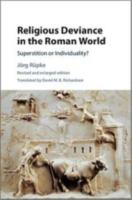
CUP (2016) h/b 142pp £64.99 (ISBN 9781107090521)
In prayers for church leaders at a recent Anglican service, the Pope was prayed for before the Archbishop of Canterbury. A few centuries ago such an act would have cost the celebrant his job, if not his life; now it provokes little comment. This modern attitude in our liberal western society reflects a move away from an expectation, indeed a demand, for conformity in religious matters to an acceptance of greater individual choice.
The book under review, as its title suggests, considers the course and extent of a similar phenomenon in the Roman world, examining how far it was possible to acknowledge and permit deviance from established religious norms and yet prevent such deviances getting out of hand. And in the modern world, where religion plays such a part in escalating conflicts and dividing societies, this is a subject whose ancient ramifications are well worth discussing.
R., a distinguished academic in the field of religious studies, deploys his exhaustive knowledge of the texts relating to religious formulations and philosophical reflections on them, to take the story from Rome’s earliest days to the codifiers of the late Empire.
Typical of the problems he discusses are Cicero’s detailed stipulations, which ‘fall into the trap awaiting every definition of religion along narrow political and/or functional lines’. This is the failure to appreciate, in this case in first century BC Rome, the real level of religious diversity predicated on levels of religious engagement.
R. is keenly alert to the fact that so much writing in this field reflects the views of the intellectual elite, while the day to day practices of the majority were either overlooked or, worse, dismissed as mere superstition, a belief that the gods should not necessarily be simply worshipped as being, by definition, good, but appeased by a range of, to the outsider, bizarre behaviours.
Shared religious practices might well be commended for their socially unifying effects, but sacra publica were only half the story, and Gellius is later cited as ‘lamenting the lack of clear rules to ensure the Roman character of colonies’, i.e. what was not forbidden (and the rules were largely procedural) was implicitly permitted, opening the door to foreign cults. Only activities and beliefs that were clearly perceived as threatening to state security or abhorrent to all right-minded people were challenged.
The subtitle of this book is Superstition or Individuality? While describing ancient disdain for the former, it suggests that the development of the latter was at one level regarded as commendable, at another as problematic, especially in the context of maintaining a core of obligatory religion designed to legitimate imperial rule. But the trend towards greater individuation is observable in the later empire.
This balanced assessment is typical of the book as a whole, which does not seek to provide answers as much as to detect such trends and patterns and to invite the reader to engage with concepts ranging from the role of religious images to the meaning of sacrilege. It is by no means a superficial read and requires a readiness to engage with complex sociological language, but the translation from the German flows smoothly. All sources are cited in their original Greek or Latin with accompanying translations.
Raymond Morris
